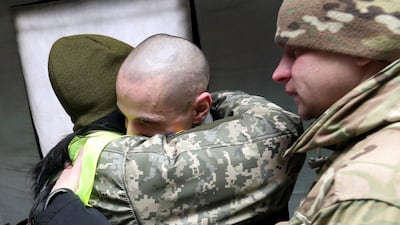Authorities and pro-Russian separatists in the war-torn east of Ukraine began a mass prisoner exchange on Sunday.
It is hoped the move will be a step forward in ending their five-year-long dispute that has killed more than 14,000.
The initiative was part of an agreement brokered this month at a summit involving leaders from Ukraine, Russia, Germany and France.
Germany and France welcomed the swap on Sunday. A rebel government official and the Ukrainian president's office confirmed the swap at a checkpoint near the rebel-held city of Horlivka had started.
The number of people freed was not immediately known, but earlier the authorities had said that 142 were expected to be swapped – 55 released by the rebels and 87 by Ukraine.
Those to be released by Ukraine include five former members of the now-disbanded special police force Berkut, who were charged with killing protesters in Kiev in 2014, their lawyer Igor Varfolomeyev said.
Ludmila Denisova, a human rights envoy for the Ukrainian Parliament, said the first group released by the rebels included soldiers.
The last major prisoner swap between separatist rebels and Ukrainian forces took place in December 2017, with 233 rebels exchanged for 73 Ukrainians.
The conflict began nearly two months after Ukraine's Russia-friendly president fled the country amid massive protests in Kiev. Russia's annexation of the Crimean Peninsula soon followed.
Hopes for ending the fighting have risen since the spring election of Ukrainian President Volodymyr Zelenskiy, who has been more amenable to negotiations with Russia on ending the war.
But questions remain over allowing local elections to take place, which would see rebel regions given more autonomy and issues over Ukraine regaining control of its border with Russia in the rebel areas.


